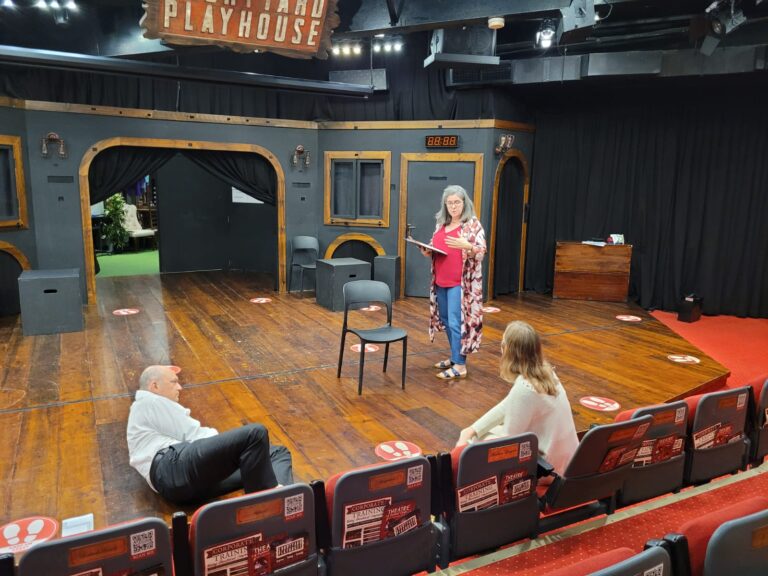– By Penny Mackenzie

The role of a director of a play is one of the most dynamic and multifaceted in the performing arts. A good director not only shapes the vision of a production but also orchestrates the collaboration of diverse talents to bring that vision to life. The path to mastering this role involves honing a variety of habits and skills, while the interplay of experience and inexperience introduces unique energies to the rehearsal room. In this blog post, we’ll explore what makes a good theater director and how experience plays a pivotal role in their growth and development.

1. Strong Communication Skills
Communication is at the heart of effective direction. A good theater director must articulate their vision clearly to the cast and crew, ensuring everyone understands their roles in bringing the story to life. Active listening is equally important, as it fosters a collaborative atmosphere where the ideas of all team members are valued.
2. Artistic Vision and Creativity
Successful directors possess a strong artistic vision that drives their productions. They envision the emotional and thematic core of the play and develop creative strategies to convey it through staging, performance, and design. The best directors are also adept at innovative problem-solving, quickly overcoming challenges that arise during rehearsals.
3. Leadership and Management Abilities
Directors must lead diverse teams, requiring decisiveness, organization, and the ability to inspire others. An effective director is not just a figure of authority but a facilitator who creates an environment where the creative process can thrive.
4. Empathy and Emotional Intelligence
Understanding the emotional landscapes of both the characters and the actors is vital for a director. This empathy fosters trust and respect, allowing actors to explore their characters deeply and feel safe in their performances.
5. Attention to Detail
A keen observation of both the big picture and the finer points of production ensures that the director’s vision is well-executed. From blocking to character arcs, attention to detail elevates the overall quality of the production, ensuring everything aligns to create a cohesive performance.
6. Technical Knowledge
Understanding the technical aspects of theater—such as lighting, sound, stage design, and costume design—enables directors to communicate effectively with the technical team and make informed decisions that enhance the production.
7. Adaptability and Flexibility
Theatre is an unpredictable art form, and being able to pivot when faced with change is crucial. Whether due to unforeseen challenges in rehearsal or adjustments made during previews, a good director remains adaptable, finding solutions on the fly.
8. Strong Organizational Skills
Planning and managing schedules and budgets are essential for a successful production. A well-organized director ensures the rehearsal process flows smoothly and remains on track, allowing for the best possible results.
9. Passion and Resilience
Passion for theater fuels a director’s journey. Coupled with resilience—the ability to overcome setbacks and challenges—this passion drives them to work tirelessly toward captivating productions.
10. Collaboration and Teamwork
Valuing the contributions of every cast and crew member builds a strong sense of teamwork. A successful director facilitates open dialogues, encouraging creativity and collective ownership of the production process.

The Role of Experience vs. Inexperience
Experience plays a significant role in a theater director’s development. Seasoned directors build on their craft through numerous productions, refining their skills, understanding audience reactions, and navigating complex interpersonal dynamics. They often draw from a wealth of past experiences, enabling them to make quick decisions, anticipate challenges, and adapt their approach flexibly. Their experience also cultivates a sense of authority, which can inspire confidence in their cast and crew.
However, inexperience in directing can bring a refreshing, unfiltered energy to the rehearsal space. Less experienced directors may approach their work with a sense of wonder and curiosity that seasoned directors sometimes lose. This can lead to innovative interpretations and unexpected connections to the material, invigorating the rehearsal process. Their lack of preconceived notions allows them to explore ideas that more experienced directors might dismiss, opening new avenues for creativity.
Conclusion
The journey of a theater director is one of constant learning and growth. By cultivating essential skills and habits—such as communication, creativity, empathy, and organizational prowess—directors set the stage for successful productions. While experience undoubtedly enriches a director’s approach, inexperience can infuse fresh energy, encouraging innovation and exploration. Ultimately, both seasoned and novice directors contribute uniquely to the vibrant tapestry of theater, reminding us that every production is a new adventure waiting to unfold.

Penny Mackenzie
Penny started out dressing up in her mother’s old ballet costumes and raiding her grandmothers wardrobe for vintage hooped skirts and velvet cloaks. She herded her siblings and cousins into musical theatrical performances written by her and performed with an ancient out of tune piano on the wooden sprung floor of her grandmother home.
The love of anything theatrical (and especially wooden stage floors) endures.
Penny has been on stage , back stage or biting her nails as a director behind an audience, her whole life.
She is excited by the outpouring of creativity that is the ever changing landscape of modern theatre and is inspired by talent in whatever form it may come: be it set, lighting, or costume design. By a brilliant performer, a visionary director, or a heart wrenching writer.
The best thing about theatre is that the opportunity for creativity is boundless. The second best thing is the fulfillment the creators feel and joy it brings to an audience.


